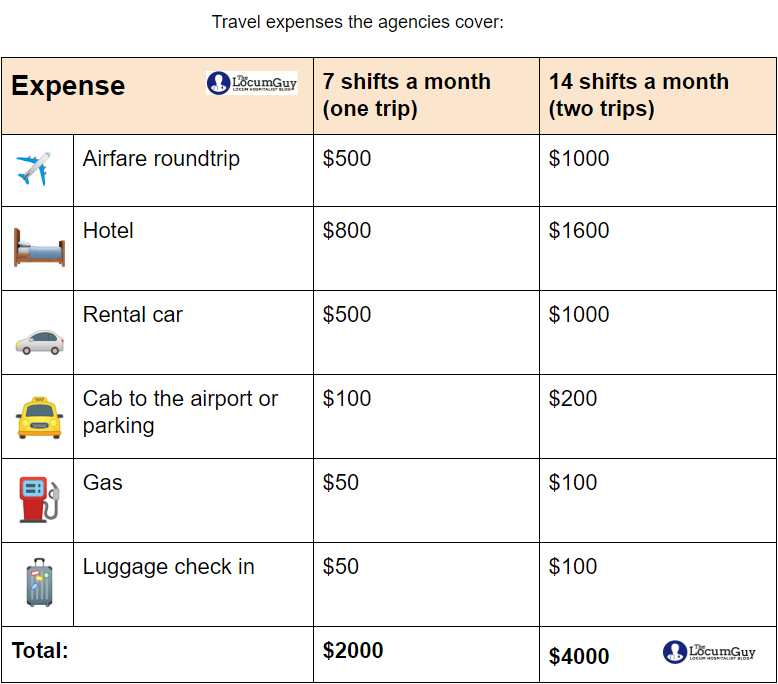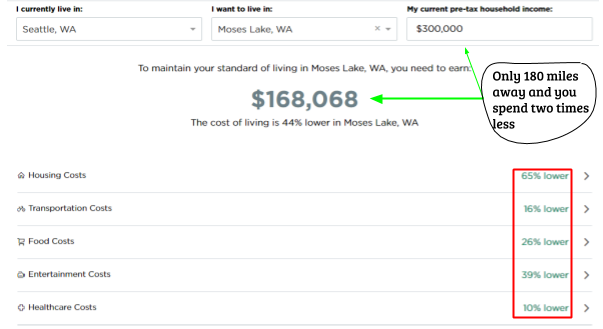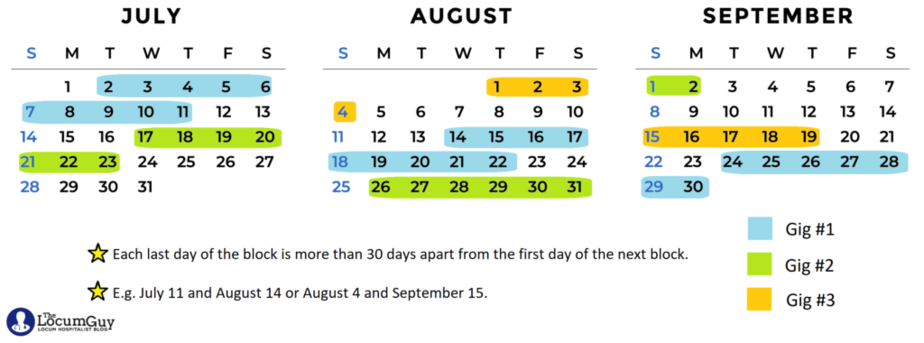

Vlad Dzhashi, MD
Locum tenens after residency has a ton of pros: you become a better clinician, make hundreds of thousands of dollars more and travel America in search of the next big adventure.
That said, I want to focus on one of the BIGGEST pros of working locum tenens after residency.
What is it?
I am talking about working locum tenens to pay off your medical school debt.
Most docs would agree that medical school debt is a huge pain in the butt.
It causes stress and anxiety, eating into your budget and limiting your financial freedom.
It’s especially painful for freshly-minted residency graduates.
A lot of them put it on the back burner and keep paying the minimum monthly payments forever.
But today I want to offer you a radical solution to crush your student debt FAST!
In fact, it’s so radical that you can pay off your loans in less than a year!
Don’t believe me?
Come closer as I’m going to share my “recipe” with you.
Recipe with two ingredients:
(LOCUM TENENS + “SECRET INGREDIENT”) x (1 – 2 years) = ZERO student debt!
Why locum tenens?
The obvious reason is that it pays better than a permanent job, especially for somebody fresh from residency.
How much you’ll make depends on your specialty and how hard you work. For example, a locum tenens hospitalist would make at least 30% more compared to the average salary.
However, if you play it smart using all the strategies I describe in this post, you can add an extra 50% or more.
“Secret ingredient” for faster check out:
While the first ingredient will make you more money, the second will SAVE you a TON!
Let me ask you this:
What are the average person’s largest living expenses?
Housing, transportation (i.e.car, gas) and utilities!
Now, what if tell you that 100% of these expenses will be covered?
Sounds great!…but how?
Your locum agency covers those FOR you!
Listen: after you graduate from the residency, you’re joining the ranks of the highly sought-after professionals.
Think about it this way: It’s almost like you are a US expat working in a foreign country where your expertise is unique. And employers go out of their way to entice you: they pay you really well and cover all kinds of expenses.
The same happens with doctors, the demand is so high that agencies are willing to negotiate to make your life easier.
Plus, they pay for travel expenses anyways, you just make them channel it differently.
Now, when you’ve got the big picture, let’s look at logistics.
How to do it?
You work full-time locum tenens:
- The key is to work enough to make it worthwhile for an agency/hospital to cover as much of your expenses as possible (i.e. 10-14 shifts a month for hospitalists).
- This way you can make maximum money while saving like crazy.
You stick with long-term locum gigs:
- Again, it makes more sense to cover your expenses if you are there for a long time.
You live where you work:
- You live in the hospital vicinity in the rented place that is paid for by the company.
- Another option is to keep a “free” home base by the main hospital while traveling to another one for extra shifts (with travel paid for you of course!).
You live in a small town:
- Your living expenses will be lower.
- You will get a better pay.
You keep your other expenses low:
- While most of your living expenses are covered, you still need to live frugally to pay off your medical school debt fast.
- One exception where you don’t want to be cheap is eating healthy and exercising. Also, it’s ok to spend money doing things you enjoy (nothing too extravagant though, so sorry, no yacht racing for now).
This will help you to keep your sanity and prevent burn out.
You live a “nomadic” lifestyle:
- You don’t buy or own any “stuff” that can slow you down.
- You should be able to take off and go to your next assignment without needing to hire a ginormous moving truck.
How much will you save?
Great question! I thought you’d never ask!
Let’s take a look:
Housing:
You see, hotels are a good deal when you are staying for a short period of time, but when you work 2+ weeks a month, it can cost thousands. It’s much cheaper to find an Airbnb or corporate apartment for you and pay lower monthly instead of daily rates.
How much do you save that way? Based on my calculations, about $15K-20K of your after-tax dollars per year.
Utilities:
When you live in a hotel or apartment, you pay ZERO for electricity, gas, internet, garbage etc.
That’s another $200-$500 monthly savings ($2500-$6000 a year).
Car:
Here’s a hack that’s even better:
You buy a car using a 3-5 year loan and ask the agency to cover your monthly payments instead of paying for a rental car. You also have them pay the gas and auto insurance.
You’re not only saving money, but you are also paying off your own car’s principal!
If you’ve already got a car you plan to own for another few years, make sure you get your gas, insurance, and maintenance expenses paid. You can also ask for a flat monthly car “stipend” instead.
That’s another $5K-10K/year saved.
How many Benjamins will you save in total?
Between $25K to $35K annually!
Now, you’ll be blown away even more if you calculate your before-tax savings.
Why locum tenens straight out of the residency?
This approach will work the best after your residency.
Why?
- You still have spending habits of a resident.
- You have fewer obligations (family, mortgage, etc.).
- It’s easier to adopt a “nomadic” lifestyle.
How long does it take to pay off your medical school debt?
One to two years depending on your student debt amount, your specialty and how hard you work.
Plug in different numbers below to calculate how long before you crush your debt.
Ok, now when you are all excited about the idea, let’s see how you’re going to do this step by step!
11 Steps to paying off your student debt working locum tenens:
Step #1 - Figure out where you’re going to work (6 months before you start locums):
I know what you’re probably imagining now: sandy, pristine beaches of Maui or San Diego…
Stop it!
If you are a guy or gal who can relax on the beach while your student debt is piling up, then Hawaii or California may be good places.
But If want to pay off your medical school debt fast, you have to play it smart and pick the states that:
- A – pay well;
- B – won’t suffocate you with exuberant taxes;
- C – have more work than you need;
Where will they pay you the most?
For hospitalists, the winners are states in the South, Southwest, and Midwest. (download the report)
As to the taxes, no income tax states are AK, FL, NV, TN, TX, WY, and SD.
Low income tax states are IN, ND, PA and WA.
Source: https://taxfoundation.org/how-high-are-income-tax-rates-your-state/
If you want to get a decent estimate of how much state income tax you are going to pay, check out this great online resource I found.
That said, always talk to a CPA to understand other important tax stuff (e.g. working in multiple states, nonresident vs resident taxation, etc.).
So if Wyoming has zero state income tax and a good pay, should I get a license there?
No way!
Your should pick the states with at least a few million people. This will let you tap into a good number of locum gigs.
Now, keep in mind:
If you find yourself stuck in “analysis paralysis,” unable to make up your mind on where you want to go, just focus on the states that you have a good feeling for.
Step #2 - Contact the locum agencies and negotiate (5-6 months before you start locums):
Before you do, take a look at my post where I explain how to find the best locum tenens companies. Make sure you check out the agencies reviews as well.
The caveat here is to work with multiple firms, both local and national.
When talking to the recruiters you need to:
- A – Tell them to look for long-term gigs (6+ months) in the states of your choice.
- B – Request that they cover your living expenses instead of the typical hotel/rental car.
- C – Negotiate your pay rate for each locum gig.
- D – Ask them to cover your state licensing cost (do not agree to a low pay rate just because they cover your license).
Step #3 - Apply for licenses (5-6 months before you start locums):
Get 2-3 state licenses to start.
The best advice here is to invest time and money into creating an FCVS profile.
I’ve used it many times and cut my licensing time by months!
FCVS fast-tracks your licensing for any state. It verifies your credentials (identity, medical school, residency training, etc.) and sends them to one or multiple state medical boards.
All boards accept FCVS verification and some boards require it.
Step #4 - Credentialing (3-4 months before you start locums):
Next step is to get credentialed at three to four hospitals.
Make sure you submit your paperwork as soon as you can, and have your agency help you to speed it up.
Onward.
Step #5 - Schedule your shifts (3-4 months before you start locums):
Now, you may be tempted to schedule 20+ shifts in one hospital until your debt is paid off.
Wrong!
As I’ve learned over the years, it’s impossible to know in advance what hospital is going to be a decent place to work.
To avoid being stuck in a bad spot, make sure you schedule only 5-10 shifts a month at each place for the first couple of months.
Another hack is to space out your shifts at the same hospital by 30 days (typical cancellation period). This way you can drop them before it’s too late.
After checking out a few places, you’ll get a good feel for what gig would be the best fit for you long term.
The only situation when you can commit to only one hospital upfront would be if you’ve worked there before (e.g. your residency hospital) and know all the ins and outs.
Step #6 - Get four types of insurance (3 months before you start locums):
Get your disability, life, locum tenens health insurance and some savings.
This will be your “safety net,” so don’t skip this step!
Onward.
Step #7 - Get rid of the stuff you don’t need (a month before you start locums):
To crush your student debt you need to become a “locum tenens nomad.”
Here, you purge all the CRAP stuff you don’t need. You will not need any furniture (and yes, that includes your favorite coffee table!).
Anything bulky that is too precious to your heart can go into storage.
Now, when all the preparation is done, you can start your first locums job ever!
Step #8 Refinance your student loan (as soon as you graduate from residency)
Even if you pay the loan balance off in a year or two, you’ll save thousands on interest by refinancing. Check out this resource list for more info.
Step #9 - First months of locums work (month 0 to 3):
Ah…you’re gonna have fun times!
You’ll travel to new places, meet a lot of people and make new friends.
There will be lots of learning too: from new EMR’s and billing to how to talk to your colleagues and patients when responsibility is all yours.
That said, after the rigors of your residency years, it’s doable.
At the end of the first few months, you’ll figure out what hospital(s) is your “tier 1” and which ones are “tier 2” (back up).
Step #10 - Cranking out until your student debt is paid off (month 4 through 12 to 24):
This is probably gonna be the easiest part:
You…keep going!
Just keep freaking doing it until you’ve paid off your student debt!
Step #11 Celebrate:
Thanks to locum tenens, your student loan is crushed, destroyed, eliminated…
You deserve a celebration, so spend a couple of days (weeks/months) doing something you’ve always wanted to but kept postponing due to college, medical school, residency…
You are free!
My confession...
Now, I want to confess…
I was a little sneaky:
I’ve not only taught you how to pay off your debt fast, I’ve also showed you how to make maximum dollars in minimum time working locum tenens.
I hope you forgive me…
The good news – you can use this knowledge to:
The end.
P.S. Now, I want to hear your thoughts on this approach to crushing your student debt.
Does it sound appealing to you?
Are you ok with living out of a suitcase for a year or two?
Let me know in the comments below!
As featured on



















How do you get credentialed at 3-4 hospitals if you’re working with agencies? Do you plan to fly to a new place each week? Or will the agencies have clients close to each other?
Alex, Hi!
How do you get credentialed at 3-4 hospitals if you’re working with agencies?
You’ll need to work with multiple agencies and initially I would slightly “overcommit” (at least when you talk to the LT agency) to get credentialed in 3-4 hospitals.
Do you plan to fly to a new place each week? Or will the agencies have clients close to each other?
It depends, you can try to find assignments that are close to each other or may need to fly or drive out of state. It really depends on how much travel you are willing to put up with and how many shifts are available at each hospital.
For example, you can do 10-12 shifts at your “home base” and travel for another 5-7 shifts in a different place once a month.
Another option is to create bigger gaps in your schedule every few months so that you need to travel only once in 3-4 months.
Let me know if you have any other questions!
Hey Dr! Im a third year medical student at a US med school. I am very interested in doing locum tenens full-time after residency. I have a couple questions Im not sure who to ask… but do you know of any restrictions for those who aren’t US citizens? Im a Canadian studying here so I’d be doing residency with a J1 visa. For locum tenens do you work through an agency? If so, could that agency provide me a J1 visa? Basically, do you know any non-US doctors who do locum tenens in US.
Your life seems amazing with this work.
Thanks a lot!
Nicolas, Hi!
Locum tenens agencies do not sponsor any visas.
If you are looking for some flexibility, once you transition to H1 (after you’re done with your J1 waiver), you could ask your employer to go part time.
Otherwise, I am afraid you’ll have to wait until you get your green card.
Having said that, if your residency sponsors H1 visa, you could get your green card within a year or two after starting your first job, so it may be a better option for you.
Let me know if you have any other questions!
Thanks!
I am a 4th year med student who plans on being a hospitalist after finish residency and wanted to ask if you are still able to have a family life while doing locums work? I have been with my significant other (SO) for the past 5 years now all throughout medical school and hopefully through the next 3 years of residency and was wondering if this gig allowed for the family work balance? I worked construction before I got into college and anything beats the manual labor I worked beforehand for shit pay, so working hard while on shift isin’t going to be a problem but did you notice any issue outside of work with family/SO?
medstudent4year, Hi!
I think locum tenens and/or per-diem work can give you balanced family life.
Having said that there is a few things you need to decide first:
– What are your financial goals? This will determine how much money you need to make.
– Where you and your SO want to live? I.e. how much expenses you will have.
– Is your SO OK with you being away from home? Is yes, how many days a month? Or Is she willing to travel with you.
Depending on how you answer these questions together (i.e. your priorities), you can start planning your work type and schedule.
The good news is that there’s lost of options between locum tenens and per-diem work to “engineer” your lifestyle and schedule.
I’ve got a wife and two kids and my goal was to minimize travel as much as possible, so I ended up working per-diem at local hospitals. I could’ve made much more money chasing highest-paid gigs in different states, but that would mean lots of time away from my family.
Check out my posts here and here where I wrote about my and other docs experiences. I also published a guest article that will be helpful.
This is a great article. I thoroughly enjoyed it. How do taxes factor into your calculations since locum tenens are 1099? I’m thinking about SE tax, paying health insurance out of pocket, disability, etc. Do you think it’s worth it to structure your “business” as a LLC or P.C. in order to make S Corps election and pay yourself a ‘reasonable salary’ to save some SE tax? Also may be eligible for 20% Qualified Business Income Deduction too (income limits apply).
Just some thoughts. I am going to share this article!
Mike, these are all great questions that should be addressed by your CPA.
Thanks!
thank you for this, so if I have around 550,000 thousand in debt ,how long using ur sneaky method, would it take me, around about?
Hi, David!
You can use a calculator inside the post to estimate how long it will take.
Will locums companies pay for housing adequate to house a wife and 2-3 small children?